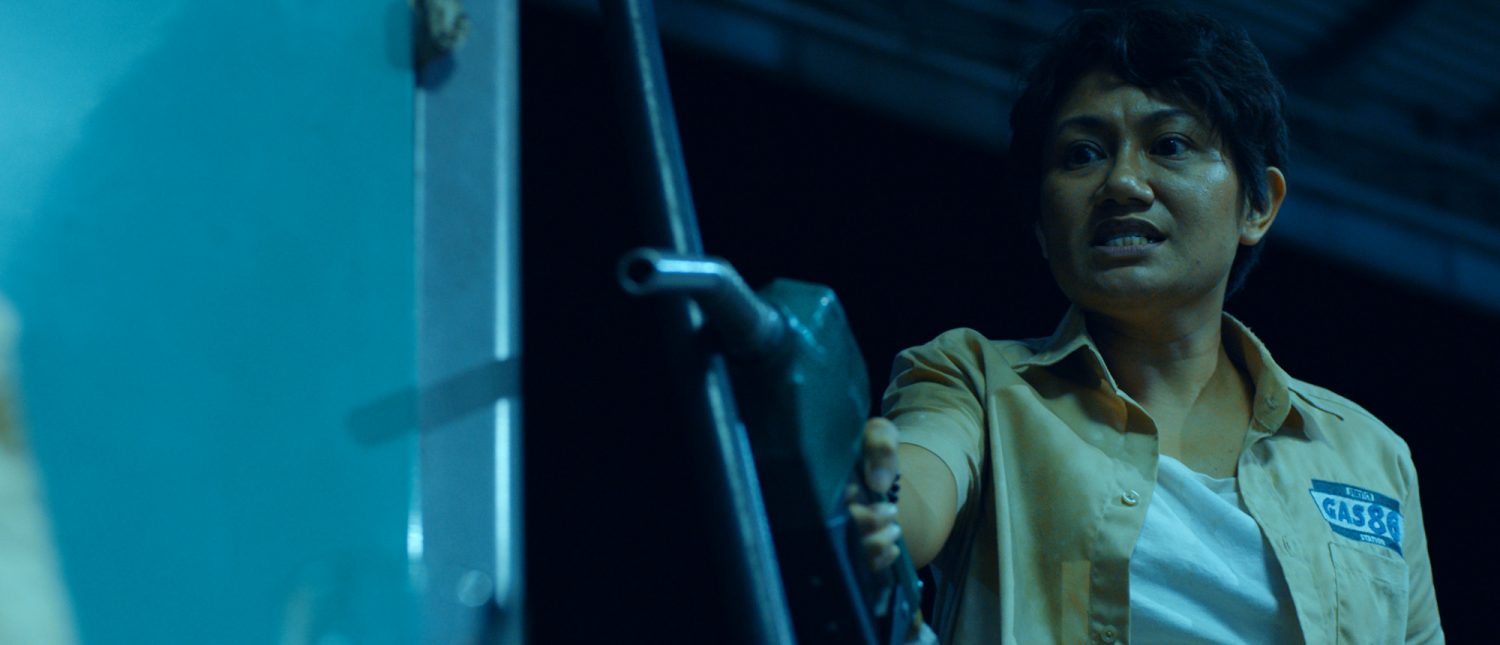Carlo Francisco Manatad and Jeremy Chua in conversation
Our Objectifs Film Club session in August 2020 featured Filipino filmmaker and editor Carlo Francisco Manatad in conversation with Singaporean producer and screenwriter Jeremy Chua, for Carlo’s Jodilerks Dela Cruz, Employee of the Month (56th Semaine de la Critique, 70th Cannes International Film Festival).The conversation has been edited for brevity.
Jeremy: Could you give us the thought process and backstory of this film? How did you come up with the story and how did it connect with what was happening in the Philippines?
Carlo: I had made few short films before Jodilerks Dela Cruz, Employee of the Month. I was starting to develop my feature film and was speaking to some producers about collaborating. My producers told me that my feature film was very different from my short films. So they asked if I could make a short film with a narrative approach.
The idea for Jodilerks came about when I was with my Singaporean producer Ling Tiong, my producer from the Philippines Armi Rae Cacanindin, and cinematographer Lim Teck Siang in Busan, over a beer session.
At that time, it was the first year of the presidency of Rodrigo Duterte and his campaign on the war of drugs was quite rampant. You read and watched in the news about the killings, the violence that was happening everywhere. I got to experience that sort of violence myself, when I drove around and there would be gunshots and the next thing I knew, someone was dead in front of me. I had to quickly get away in order to save myself. You saw such violence on a daily basis in the streets of Manila to the point where you get desensitized.
When I started thinking about the story for Jodilerks, there was an ironic element to it. She’s actually the employee of the month, but on her last day of duty, she sees something violent and she doesn’t care. But she really does, because there are a lot of elements involved, she’s going to be unemployed. And there are these layers in her character that when she decides on something, it comes across as unrealistic. But it is what happens when somebody actually feels her rage and anger exploding.
Jeremy: Many of your works have this balance between an absurdist world and reality. Perhaps it comes with the context of the political change, and the aesthetics of your film gives a sense of super realism or hyperrealism, with a bit of eccentricity. When you shared about what you had experienced, to see so much violence right in front of you, that must have been quite an important moment for you to decide about building the context and characters of the story.
Could you talk about the aesthetic changes, in contrast to your previous shorts? Is this the first time that you incorporated heavy metal music in your film? Everything feels a bit faster, a bit more frantic.
Carlo: Many would say that my films are on the weird spectrum, almost absurd, but the absurdity of my films is still derived from human experiences. It takes on more of a voyeuristic approach on the middle class.
I make films that people don’t think about making, because they think that these stories are very small, that these stories are not stories to tell in a way. But all these small stories have a big world inside them.
I feel that we are living in a hyper realistic world, regardless of the societal context that I’m living in the Philippines. What may be abnormal to the viewers outside my country may be normal to us, but also vice versa. And I think it works both ways.
I feel that it’s more important if the narrative and the emotional nuance of the story is transcended, even without understanding the context. By the time you finished watching the film, you do feel something. Sometimes you can define it, sometimes you cannot, but you found or felt something. That it is one of the most important parts of filmmaking.
With regards to the music, I like working on the technicalities of the film. I also write, but I’m not a good writer. I’ve also been an editor for quite a while. I’m really amazed by how other elements of filmmaking, and not just writing or directing, can affect a narrative. If I make films with or without dialogue, or very little dialogue, I play with the other elements of filmmaking like sound. I’ll explore how the sound can affect the narrative of the film.
I’ve been editing my own films, but Jodilerks wasn’t edited by me but by Lee Chatametikool. It was an exercise given to me by my producers. My past short films were always with a small crew and I would work with non-actors. There was not much pressure, I would usually use my own camera, and work with low or no budget. But my producers were pushing me and preparing me for the time when I’d start making my feature. They were not sure if the way I work on my shorts, which is usually very loose and not so systematic, would work the same way for my feature film.
For Jordilerks, they asked if I would be willing to experience something different in terms of how I approach filmmaking. I was quite afraid because unlike my past short films, I felt the pressure. For Jodilerks, I was working with a larger group. It was my first time working with a high-end camera and with experienced actors, so there was this pressure to make it work. I was also working with Lee, who is one of my idols, and I felt like don’t know what to do! But I tried to control myself and took control of the situation. It was a nice process for me and I think it helped me prepare for my feature.

Jeremy: Besides directing, you are a professional editor and you’ve edited for a lot of filmmakers. What was the writing process like for you, knowing that you were not going to edit your own film? As a filmmaker who is more adept at using visuals to communicate as opposed to using texts, how do you translate what you want to tell to your DOP, sound designer, and the rest of the crew?
Carlo: The first three films that I’ve worked on did not have a proper script. Usually what I do is this: I have an idea; I’ll think about a scene that I want, and then I’ll just infuse it in the film, then make notes on bullet points. My past films don’t really have the classical narrative approach, so my film becomes independent on its own regardless of where you place it. But in the end, when you piece it together, it’s still the same film.
With Jodilerks, I was required to write a script, and it was a very interesting process for me. When I was asked to make a short film like this, I had two ideas in mind. One was about a couple that literally blow each other up on fire. And the other story was about a teenage couple that has this sexual tension going on. But those concepts were more expensive than Jodilerks. The treatment for those two ideas was actually ready. I decided to use some elements from both stories and piece them together.
It was easier for me because I was just describing it, and there was no dialogue. With my short films, I’m confident about them whether they are written or not. For instance, certain scenes that you see in my film are actually not in the script. The same goes for Jodilerks, there was the scene where the change of price in gasoline wasn’t in the script. The ending scene, where everything blows up, wasn’t in the script too. So I basically treat the script as something of a guide and structure for the whole film, and I’m more spontaneous that way.
Jeremy: Did you get the actors to improvise on set, and was there any workshopping done with them?
Carlo: There wasn’t a workshop with the actors because everything was done so quickly. I do remember an interview that Angela Bayani (lead actress) gave. They asked her how it was like working with me as it was our first time collaborating.
She replied that she was quite confused because I would ask her to do something that wasn’t on the script. But also, Jodilerks doesn’t have a lot of dialogue, it matters how she acts in terms of the transition of her face. So I would give her scenarios or would reference it to something that’s more narrative, like what if your son has been kidnapped or scenarios that can be easier to grasp.
There was a particular scene that I think really got her confused. We were on a break and everyone was setting up. I saw her in the middle of the set. So I told one of my crew to ask Angela if she could pee in the middle of the gasoline station. And I asked the production designer for a new piece of shorts so that we don’t see it. Everything went by so fast. That scene took place towards the end of the day, we were finishing the shoot and she did not have the time to ask me. But when she watched the film, she knew that it worked and why I wanted that scene.
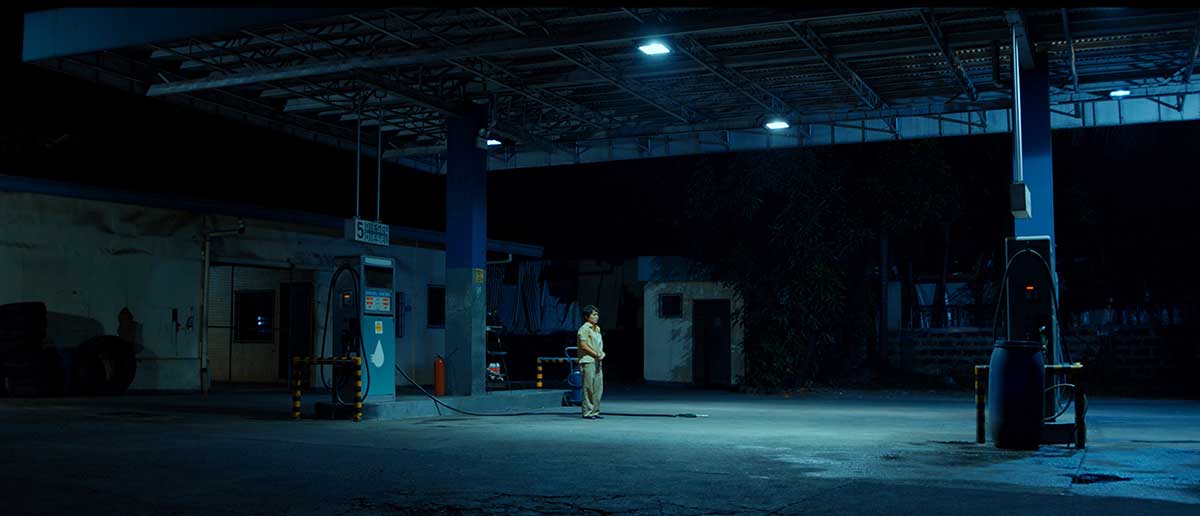
Film still from Jodilerks Dela Cruz, Employee of the Month
Jeremy: Back to that moment when you asked Angela to act spontaneously, did you already have that scene in your mind? Were you editing the film in your mind or did you know that something was missing?
Carlo: I think a big advantage for me is that because I’m also an editor, I don’t waste time. I’m more precise with that I want in the film.
Jeremy: This is like a producer’s dream!
Carlo: But yes, we did shoot the whole film in just one night. We started the shoot late around 7pm. We finished around 5 or 6 in the morning. We had to be efficient because we didn’t have enough money to shoot for one more day.
It helps that I’m an editor. I shoot what I think the film needs. I would look at my bullet points and see these scenes. When I’m at the location, I feel that even if the scene is erased, or if I don’t shoot them, it’s still the same film. So I would change something that could actually work, rather than putting something in that it’s relatively the same.
Jeremy: Regarding the writing in most of your films, there are moments of very gestural, movement based, that’s almost like a dance, like epileptic seizures. How you’ve constructed the dialogue… it is like a screen dramaturgy or experimentation with the form. When you were thinking about this, did you know if it would work? Or were you trying to play with a kind of action?
Carlo: The honest answer is, I’m just playing. I really want to play with the form and with how characters actually react to the situations that they feel aren’t normal. But it was also very unconscious.
When I look back from my first film up until Jodilerks, there will always be one character that would either dance or sing. And I think with body movements, it doesn’t really connect to what’s happening with the whole narrative. If you see the character moving, how she moves with the scene, it connects to the narrative and then you actually get to read her character. So how she moves, or how she sings, that’s how I feel. It’s more about changing what is usually done through dialogue. I’ll use movements or other elements like sound, dancing, performing or even what kind of songs that they are singing, to emote what I want to tell in the story.
Jeremy: It’s feels like a chorographical mise en scene.
You’ve mentioned that you take into consideration the technical aspects of the music. What was the process like for you, knowing that you were not editing the film and would hand it over to Lee? What was the outcome like? What changed from your interpretation to his adaptation?
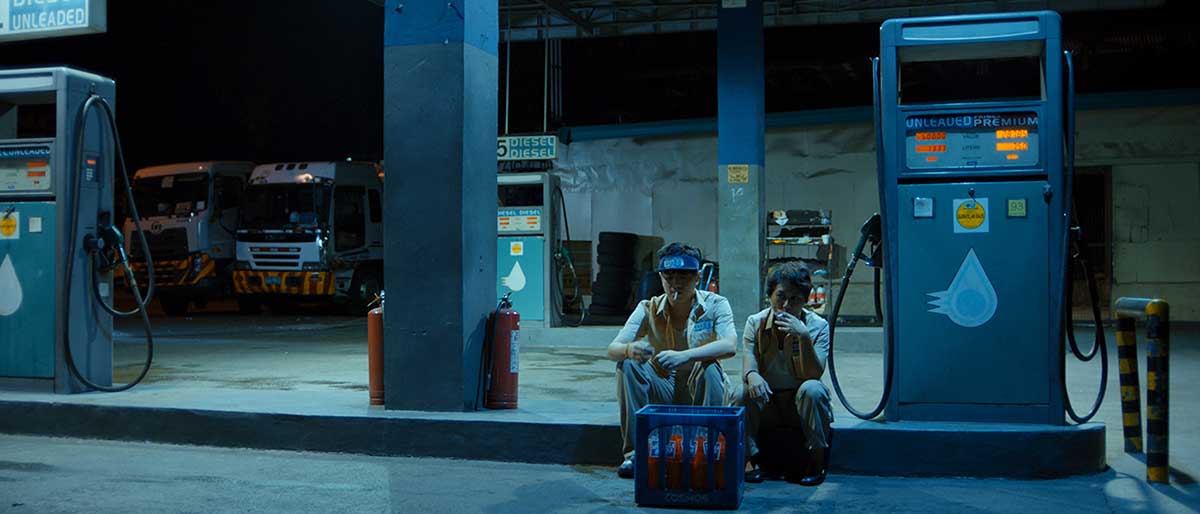
Film still from Jodilerks Dela Cruz, Employee of the Month
Carlo: The first time that I sent him the screenplay, Lee’s first reaction was that this is weird. He asked “What is this?”, I said “It’s rock and roll.” and he said “Okay, let’s do this.”. But he still didn’t really understand the essence of everything as he had just read the script. He hadn’t seen the footage or what we shot.
He is one of the filmmakers that I look up to, not only as a director, but primarily as an editor. For the longest time, I would look up to his works. When the time came when I was with him during the editing of the film, I was not sure how to go about it because I just feel like I was a kid next to him. It was like trying to give instructions to a king!
After a few sessions, I decided to be more direct, telling him that I wanted certain scenes to have a grungy feel, to have a rock and roll mood or to feel more punk. As time went by during the editing, I started to understand the context of the film, what the film is trying to push in terms of the feeling or like the play on form.
And it worked for me in a way. It was a nice experience working with Lee. It prepared me to learn how to work with people or under different circumstances. I’m very protective, especially with my own work, with my films, but this experience made me loosen up. You learn from collaborations, from other people that you haven’t worked with before. You do learn something from them, from the process and perhaps unconsciously get to apply it with other works or even in your everyday life.
Jeremy: It’s nice being able to work with your idol.
Let’s talk more about your feature film. Can you share about transitioning from writing your short films to your feature film? Did you pick up on something that helped you to tackle the approach to your feature film writing?
Carlo: If you’re given the opportunity to work on your first feature, you would grab it. In the Filipino context of filmmaking, a lot of filmmakers actually just go straight to doing feature films. But in my case, I did not take that route, as I felt that I wasn’t prepared to work on a feature yet.
Once you start working on your first feature, there’s no turning back. It was an unconscious feeling but I felt like it was a nice process for me to work on my short films first. Starting out with short films helped me in terms of the knowledge and process. Each short film helped me hone what I could do and gave me confidence. Because I was working on my shorts, I wasn’t in a hurry to make a feature. But in between, I was already developing my feature. I was doing workshops in film labs. It made sense to start my journey with short films before I felt like I was finally ready to embark on my feature film.
Jeremy: When was that moment where you felt that you were confident to take the next step in your film journey to feature films?
Carlo: I made another short film after Jodilerks. I was part of the TorinoFilmLab (a feature film script lab) and during the final event, the participants were asked to present trailers or teasers of their projects. My film was about the aftermath of Typhoon Haiyan. But I was not able to shoot, as during that time, it was two months after the typhoon hit. We didn’t have enough money for the production design. I had to devise another plan.
So I shot something that happened before the typhoon, but then I realised that I could actually make a short film out of it with the footage I had. After making that short (The Imminent Immanent), it occurred to me that all these culminated to a point where I did a short that’s actually connected to the narrative of my feature. And I think that’s the point where there’s no turning back.
It’s been five or six years that we’ve been developing the feature, we’ve been going around to various film labs, and I think that’s a good amount of time to work on. During that time, I told myself that maybe this is the time to start my feature film production. We started production, and we finished shooting the feature before the COVID-19 pandemic.
Jeremy: Let’s return to the political changes in the Philippines at this time with this short film. What did you want to portray, and what was the message to the audience in the rest of the world?
Carlo: If you look at some of the past films from the Philippines, they tend to focus more on poverty. If you mention the Philippines, you already know what’s the background of our country in a way. I didn’t want to use those elements because if I make a film about aliens, and set it in the Philippines, there would always be societal issues and it’s there because you will contextualize it anywhere in the country that you’re in.
I wanted to highlight these societal problems in the Philippines, but not in a way where I over-visualize it. I was trying my best to do that and I hope it works in a way, telling these little stories from the Philippines in a different approach. Jodilerks is basically a film about unemployment. But there wasn’t a conversation about losing jobs. So I just want to show how it feels to be unemployed.
Audience Question: How do you cast the actors and how do you choose the actors you want to work with?
Carlo: Being an editor, I’ve seen many films that Angela Bayani was in and I do feel that she’s very good in her craft as an actress. My producer, Armi Cacanindin, is a good friend of Angela. When we thought about whom to cast, she was the first one I wanted. I asked Armi if she could contact Angela. The process of casting is very different for each project. At least for this film, I already knew that I wanted to work with Angela. But for other films, I have a different process.
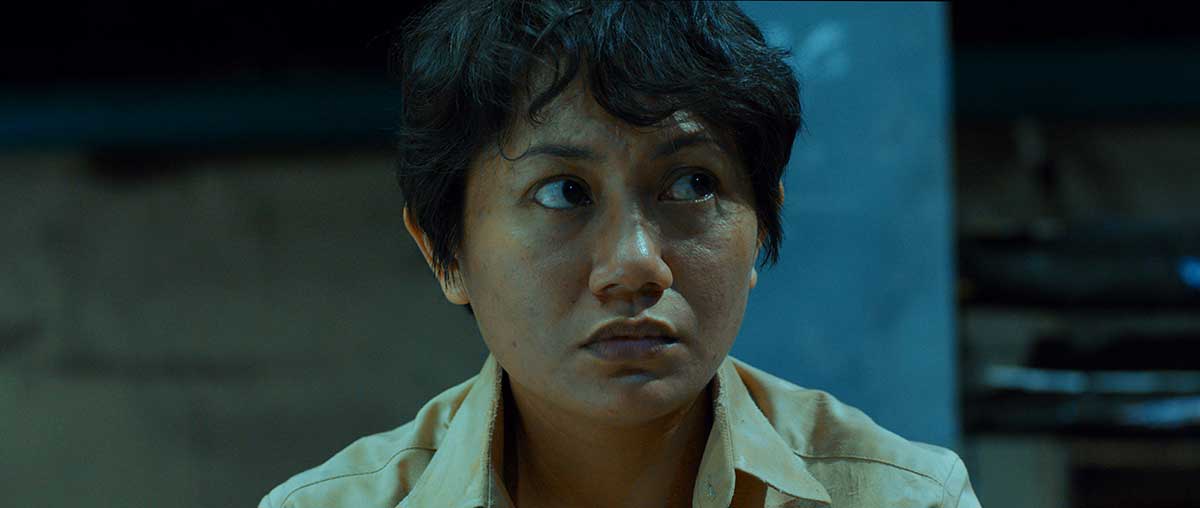
Angela Bayani in Jodilerks Dela Cruz, Employee of the Month
Audience question: Did you intend for the film to be a little nihilistic in terms of the resolution of the story, where Jodilerks chooses death as an escape for herself?
Carlo: I think yes. Many films have happy endings as a resolution. I do feel that I managed to portray how I felt in many levels, like how I felt towards the government, or personally about my family, and the society that I’m in. I think that many people have problems inside them, but they don’t really speak up or say something. Everyone has this rebellious streak inside of him or her. And I just want to put it out there.
Audience Question: Your filmmaking style is very distinct. Who are your inspirations when it comes to filmmaking?
Carlo: I don’t watch many films. I’m not a super cinephile. But I really connect a lot to films by Yorgos Lanthimos. His style is very distinct and relatable in a way but yet not at the same time. It makes you question what reality is, and I think I was really inspired by how he pushes the hyper realistic essence of his films.
Jeremy: For the young filmmakers out there: how do you get your film to be seen outside of your country, or be noticed?
Carlo: Based on my own experience at that time, short films were quite overlooked in my country. When I was working on Junilyn Has (2015), there was this notion that it is not a film if it’s a short film. Back then there weren’t many short film festivals in the Philippines. Things are different now though.
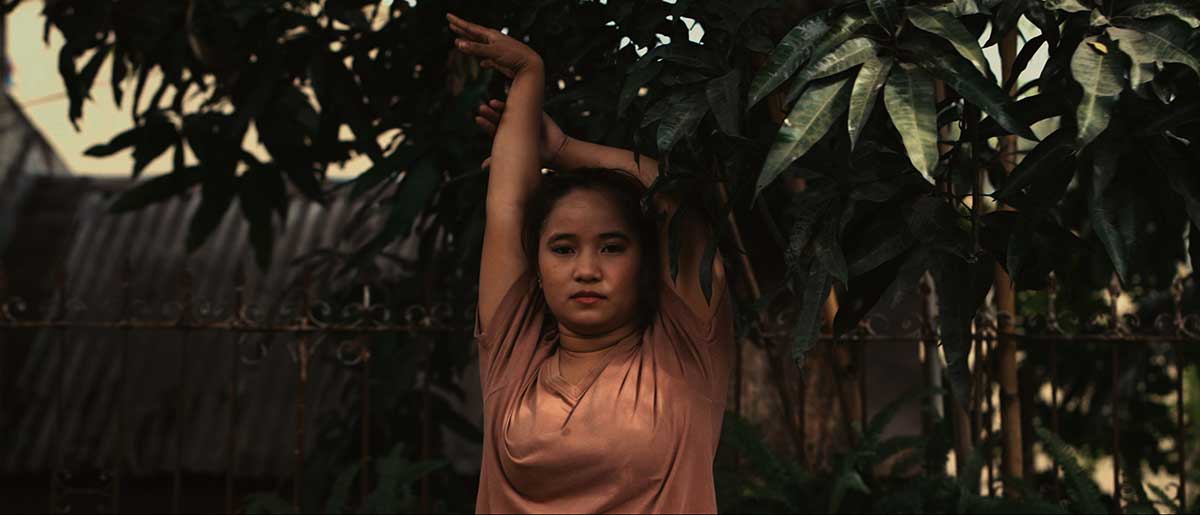
Film still from Junilyn Has. Rent it here.
I wanted to see what I could do with a short film. Not many people submitted their shorts outside of the country then, as there was no interest. Many young filmmakers who want to be directors go straight into making feature films. I do feel that it was an advantage for me because nobody was making short films, and I was going to make short films and submit them to film festivals.
There is this notion that films from the Philippines have a certain style or story and people form their own impressions when they think about what a Filipino film is supposed to be. But when they watch my films, they feel that it is different. And I think it has worked out for me.
When I was in film school, everyone wanted to be a director. And I didn’t want to compete with them. I thought to myself – I need to pay the bills, make a living, so what’s the next best thing that I want to do? And what I enjoyed was editing. But after a few years, I started asking what do I really want to do? Yes I’m an editor, but I know that I really wanted to direct.
When I made my first short film, I told myself that if this doesn’t work for me, I’ll stop directing but I can still be an editor. But it actually worked out and it didn’t stop. There was momentum because it went to big film festivals like Locarno and Clermont-Ferrand. I didn’t want to stop the momentum so I continued making a few more shorts. It also helped that I got to travel to international film festivals, because we don’t get to watch that many international shorts in the Philippines. When I watched some of these shorts, I got inspired unconsciously when I make my films.
Jeremy: Could you give us a timeline of when was the moment you felt like the international community started to recognise you?
Carlo: I did not plan on going ‘international’ per se. I wanted to try directing, to make a film and then enter a local film festival. I submitted my film to Cinemalaya and I got rejected. I thought to myself – this is the end and I’ll just go back to editing. But a friend who is a producer (Ferdinand Lapuz), told me that he liked my film and I should submit it to film festivals like Toronto or Locarno. I couldn’t even get into a local film festival so why would I submit to an international one? But he told me that he would help me.
I submitted my film to Locarno. I waited and then I got an acceptance letter from Locarno. And then more invitations came in. I wanted to keep the momentum and started making more short films. My first three shorts were shot in the same year, but I once I finished shooting, I didn’t edit them. It was a conscious decision. Once an earlier film of mine is on its last leg of the festival run, I’ll then work on my next film.
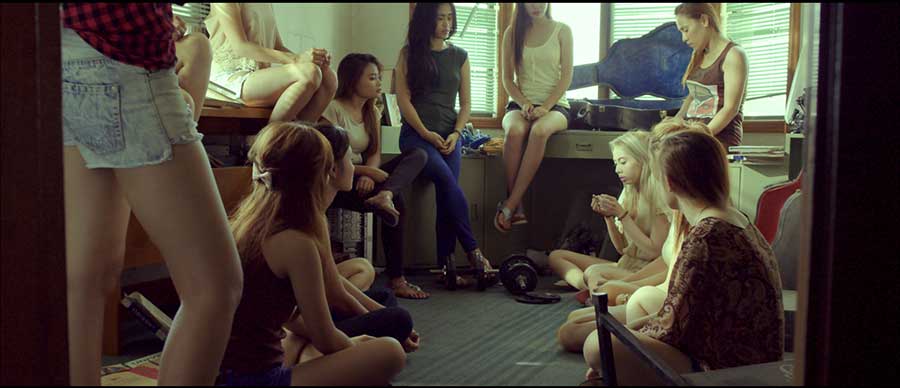
Film still from Sandra by Carlo Francisco Manatad. Rent it here.
Audience Question: Can you share more about your experience collaborating with Lee since he is a master in editing? Were there any instances in your process of working together that made a big difference or impact in changing your treatment?
Carlo: There weren’t many changes treatment wise, as I was very sure about what I wanted. I was actually surprised with how he edited certain scenes, and how he connected and weaved some of the scenes together.
There were scenes that he took out and it works, it’s still the same film that I want. There were certain sequences that didn’t have many shots. To some people, they might think it’s easy to edit since there’s not many shots, but it’s actually harder to edit. Lee made it work with these sequences; there is subtlety in it.
Audience Question: As someone who has as much experience directing shorts as yourself without a budget and with minimal equipment and crew, can you share some tips on how to create a team for someone starting out with no film school experience?
Carlo: More than anything, and based on my own experience, work with people that you trust and are comfortable with, and who have good taste. The people that I’ve worked with are friends from film school, film organisations. I’ve also worked with people who are good at their craft but it’s my first time working with them. I combined these two elements and it has worked out in a way.
Jeremy: Have you ever found someone you wanted to collaborate with through your travels at film festivals or because you’ve watched their films?
Carlo: I’ve collaborated with people that I’ve met in festivals and we became friends. When I was at Clermont-Ferrand, I met a Chinese filmmaker named Qiu Yang. We started hanging out and became friends. After a year or two, he contacted me and asked if I wanted to work on his film and I agreed. His film (A Gentle Night) got into the main competition at the Cannes Film Festival and he won the Short Film Palme D’Or. He continued to ask me to work on his next few short films. These experiences going to film festival is not just about watching films, but also meeting such people.
Jeremy: The human connection is such an important part of filmmaking.
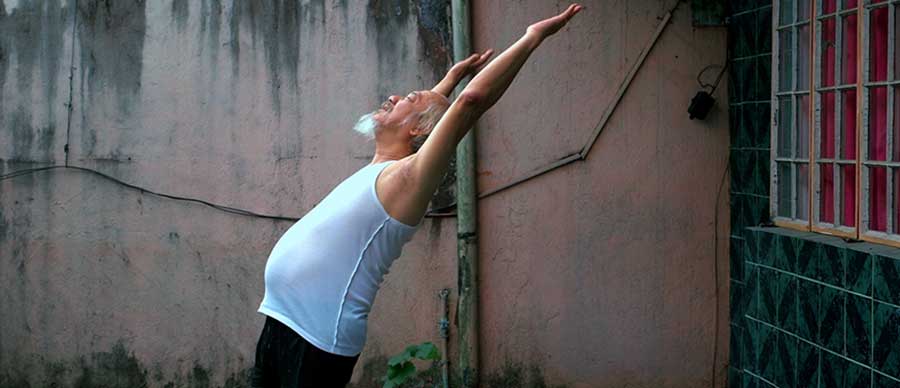
Fatima Marie Torres And The Invasion Of Space Shuttle Pinas 25 by Carlo Francisco Manatad. Rent it here.
Jodilerks Dela Cruz, Employee of the Month and Carlo’s other films, along with with other short films by Southeast Asian filmmakers, are available to rent on the Objectifs Film Library.

